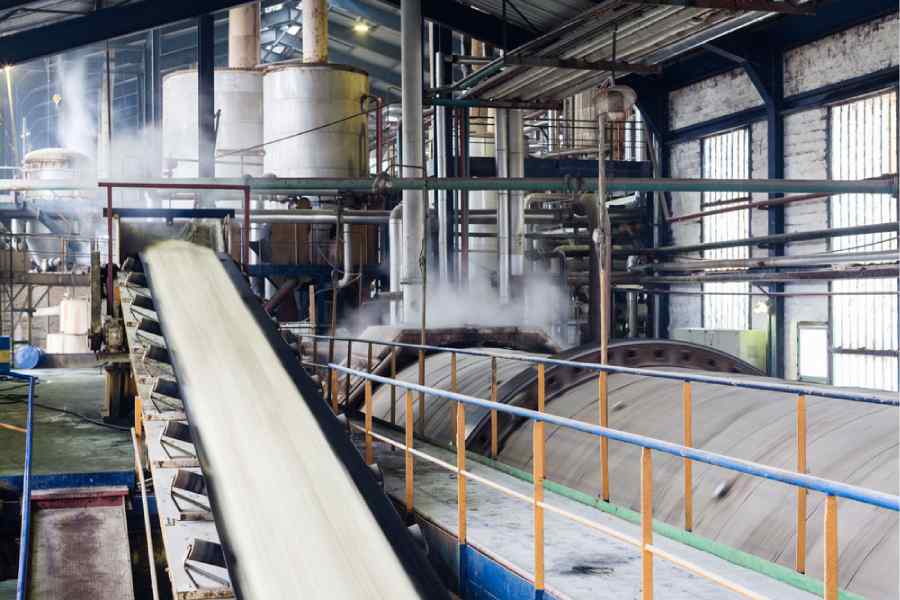The government on Friday asserted that it is committed to meeting the 20 per cent ethanol blending target by 2025-26 and said the ban on the use of sugarcane juice and sugar syrup has been imposed as a "temporary" step due to lack of clarity on cane output for the current season.
However, the government has a plan in place to promote ethanol production through various feedstock such as B and C-heavy molasses, damaged rice and maize.
The government also said the situation has not reached a stage for the country to undertake the import of ethanol.
In 2022-23 ethanol supply year (November-October), the government achieved 12 per cent blending of ethanol with petrol.
The target for the current year is 15 per cent for which 690 litres of ethanol would be required.
On Thursday, the food ministry banned the use of sugarcane juice and sugar syrup for making ethanol in the 2023-24 ethanol supply year amid a likely fall in cane production owing to drought and rainfall in key producing states.
In a joint media briefing, Food Secretary Sanjeev Chopra and Petroleum Secretary Pankaj Jain dispelled market rumours regarding the adverse impact on the ethanol blending programme because of the ban.
"The government is fully committed to the ethanol blending programme. Absolutely, there is no question of dilution of our commitment to that programme," Jain said.
In 2021-22 supply year, the government had achieved 10 per cent ethanol blending well in advance. In 2022-23 despite concerns over rice supply which FCI had stopped, the ethanol blending of over 12 per cent was achieved. The ethanol blending target for 2023-24 is 15 per cent for which 690 litres of ethanol would be required. The oil marketing companies have already secured bids for a supply of 500 crore litres for this supply year, he said.
Both Petroleum and Food Secretaries also clarified that the B-heavy molasses will be allowed for the current offers received by the OMCs. Additional B-heavy molasses will be allowed in the future subject to monthly review.
"OMCs have secured bids for supply of B-heavy molasses for the first cycle. As and when they float bids for the second cycle, by then a better picture will be available not just to the government but also for sugar mills," Jain said.
However, the long-term plan is intact. "What we are seeing now is a temporary pause and this is subject to a review," he added. According to Food Secretary Chopra, the country's total sugarcane production is estimated to be quite less as compared to last year. As per the first advance estimate of the agriculture ministry, sugarcane production will be lower at 434.8 million tonnes in the 2023-24 crop year (July-June) as against 494.2 million tonnes.
"We were anticipating cane production to be low but didn't anticipate it will go down further. The recent rains have brought the recovery per cent further down. The drought in Maharashtra and Karnataka is worrying," he said.
"As of now, we are estimating sugar production of 32.3 - 33 million tonne for the 2023-24 season (October-September), as against 37.3 million tonnes in the previous season," Chopra said and added there would be 22-40 per cent reduction in sugar production in Karnataka and Maharashtra this season.
On the promotion of maize as feedstock for ethanol making, the Secretary said the agriculture ministry is working with the Ludhiana-based Institute of Maize and Distilleries to come out with a scheme to increase productivity and production from the current 36 million tonnes.
Meanwhile, the committee of ministers has approved a scheme whereby cooperatives Nafed and NCCF will procure maize directly from farmers at a minimum support price (MSP) and supply to grain-based distilleries at MSP plus mandi tax. The incidental expenditure incurred by NAFED and NCCF will be borne by the Food Ministry.
This will kick start and nudge everybody to adopt maize as feedstock for ethanol production, he said. There are about 120 grain-based distilleries in the country which can use maize as feedstock for making ethanol.
"We are coming into that phase of the ethanol blending programme where we will focusing on much more on maize. The simple reason is we do not have much area under cultivation of sugarcane," the Petroleum Secretary added.
Except for the headline, this story has not been edited by The Telegraph Online staff and has been published from a syndicated feed.

